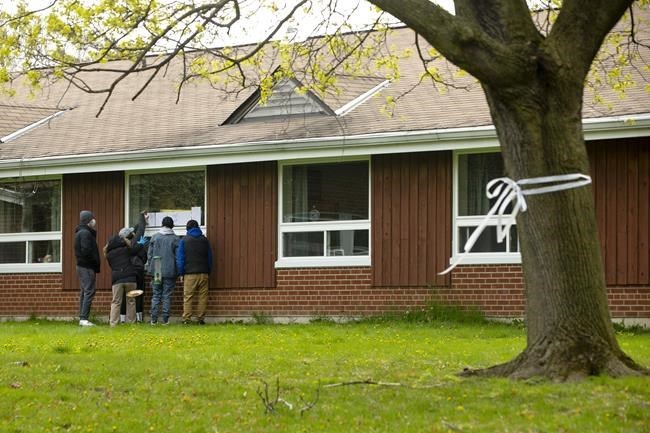Residents of a long-term care home hard hit by the COVID-19 pandemic were crammed into overstuffed rooms and denied access to life-saving treatment because the facility was short on both staff and equipment, their families told Ontario's commission on the matter.
Family members of some of the 70 residents who died and 155 others who were diagnosed with COVID-19 during an outbreak at Orchard Villa in Pickering, Ont., told Ontario's Long-Term Care COVID-19 Commission that the deaths and many of the infections could have been prevented had the home held up its duty of care.
"Current regulations indicate that if a resident is not being nourished and hydrated, their power of attorney must be notified. But this regulation was not adhered to during the lockdown," said Cathy Parkes, whose father died of the virus at Orchard Villa in April.
"We feel that almost every death could have had a different outcome if the families and POAs were informed and allowed to send the residents to hospital, which many of us weren't."
The outbreak at the 233-bed facility was declared in April and stretched into early June, by which time members of the Canadian Armed Forces had slammed the home in a damning report.
It found that residents of the home were left for hours in soiled diapers, were force-fed to the point of choking — potentially leading to the death of one resident — and were improperly restrained.
The families of Orchard Villa residents have launched a proposed class-action lawsuit against the company, and their allegations have yet to be proven in court.
But in their testimony to the commission in mid-October, which was conducted behind closed doors and released to the public as a transcript just this week, Parkes and her group said the province can mandate changes that would prevent such atrocities going forward.
"The rooms that are specified as semi-private are so cramped that often furniture has to be moved to allow a resident to exit the room in their wheelchair," Parkes said, noting that the facility also has many rooms with four beds — something the province said should be done away with two years ago.
Marie Tripp, whose mother died at Orchard Villa in April, said the home did not have enough ventilators or oxygen tanks in good working order.
"Many infected and dying residents did not receive oxygen due to the fact that the life-saving equipment was not properly maintained," she said, citing the military report and the families' own observations.
A spokesperson for the facility denied this allegation.
She said the group recommends ensuring that each resident have access to oxygen "or failing the availability of oxygen, that each resident be sent to the hospital to receive care."
Fred Cramer, whose mother also died of COVID-19 at the facility in April — less than a year after moving in — told the commission that short staffing didn't help matters.
"During the beginning of the lockdown, many of us were told by Orchard Villa staff that they were extremely short-handed and therefore unable to care for residents in the manner they deserved," he said.
"This was especially true during the evening and overnight shifts. We were aware that the residents went without food, hydration, medication, and basic care. We recommend a standardized plan for staff/resident ratios inside and outside of an outbreak."
The issues, the families agreed, predated the pandemic.
Carolin Wells, whose father moved in to Orchard Villa on Nov. 5, 2018, said there were signs immediately after he arrived.
"The next day we got a call that he had a lesion on his arm. He fell the day he was admitted. On November 15, he fell out of bed, and he hit his right elbow. November 27, he had a skin tear on his right hand. He was in the TV room and tried to stand," she told the commission.
"He was found out in the parking lot. And my dad could not walk. He was in a wheelchair. He had had a major stroke. So he was found out in the parking lot."
She said the injuries and violations continued throughout his time at the facility, until his death of COVID-19 in April.
The company that owns and operates Orchard Villa, Southbridge Care, said it was committed to providing high-quality care to residents.
"Staffing was a challenge at Orchard Villa during the pandemic," said Candace Chartier, chief seniors' advocate and strategic partnerships officer.
"To prepare for the second wave and enhance our hiring efforts, we have hired ... an HR specialist as a dedicated recruiter."
Lakeridge Health, Durham region's acute care provider, said Orchard Villa had been managing a COVID-19 outbreak for almost two weeks before a team from the agency was brought in to support them in late April.
Lakeridge said it added dozens of front-line staff to support care to residents including deep cleaning, infection prevention and training staff on the use of PPE.
Durham regional police have said they're investigating allegations about goings-on at the facility, but did not have any updates on the status of that probe.
But the families said they're sympathetic to the staff members at the home, who they said are put in difficult or impossible situations.
"We would be remiss if we didn't also speak to our worry that a culture of fear exists among the staff at long-term care homes," Parkes said.
"This fear put on the staff by owners and management has kept the province from hearing the most important details of what has occurred in our long-term care homes aside from the residents' own stories."
This report by The Canadian Press was first published Nov. 13, 2020.
Nicole Thompson, The Canadian Press



